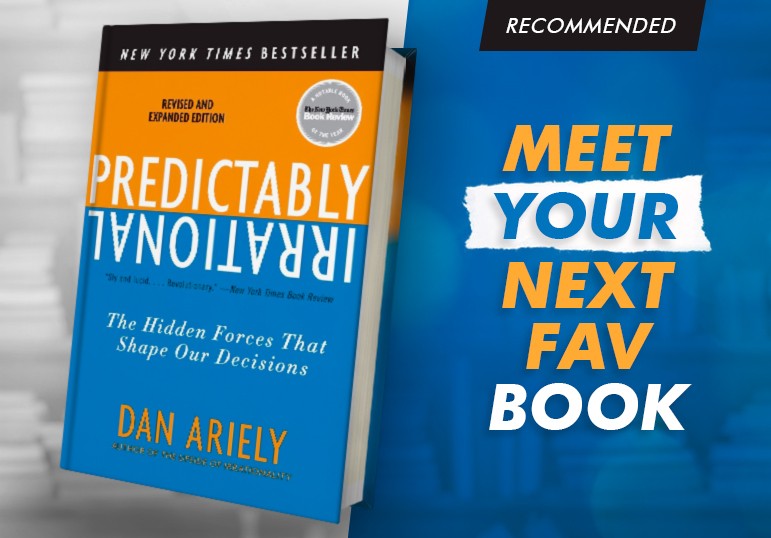
Book Review: Predictably Irrational by Dan Ariely
- posted by: Abdul Latif Dadabhouy
- No Comments
The bookPredictably Irrational: The Hidden Forces That Shape Our Future explains the hidden forces that drive how we make our decisions, which are far from rationality than what we think but can help us stay on top of our finances, interact better with others and live happier lives, once we know about them. We are listing down some of the most important highlights of the book.
About The Author Dan Ariely
Dan Ariely is an Israeli-American professor and author. He serves as a James B. Duke Professor of psychology and behavioral economics at Duke University. Dan is the founder of the research institution The Center for Advanced Hindsight. He is also the co-founder of companies including Kayma, BEworks, Timeful, and Genie. Ariely is famous for his TEDtalks and his talks have been viewed over 15 million times. The author has appeared in numerous documentary films naming The Inventor: Out for Blood in Silicon Valley and produced and participated in (Dis)Honesty: The Truth About Lies. He has written over seven books, including Three New York best sellers Upside of Irrationality, The Honest Truth About Dishonesty, and Unpredictable irrationality. Dan’s a professor of psychology and behavioral economics, how we make choices, especially about money, are his forte and prior area of interest. Ariely was named one of the 50 most influential living psychologists in the world in 2018.

The Main Idea of Predictable Irrationality
The main crux of the book revolves around the idea is that consumers are systematically irrational in their behavior at best making sub-optimal choices, and at worst engaging in self-punishing behaviors. It also includes how we as consumers tend to focus on what we may lose, rather than what we may gain. And with everything we attempt to do, we should train ourselves to question the repeated behaviors. One of the main elements includes how we assume other people will see monetary transactions from the same perspective as we do. Or giving up on our long-term goals, with procrastination.

The Truth about Comparison
An important thing that is highlighted is how we’re wired to compare things, and our brains do so in the easiest way possible. We often compare what’s right in front of us, not necessarily what we should think about or look at that might not be around at the time. We are only able to make judgments by comparing the prices and offers of one thing with that of others. So if you give people options to compare your products to, which are slightly worse, they’ll pick yours more often. We rarely choose things in absolute terms. Instead, we focus on the relative advantage of one thing over another and estimate value accordingly.
The Cost of Zero
Zero or free is a source of irrational excitement; it’s called the “zero price effect.” Consumers will pay more just to be able to get a free gift or bonus, such as free shipping. And they’ll wait in line for long durations or go to extraordinarily long lengths to get something for free. For example, as Amazon rolled out free (Super Saver) shipping across markets, sales increased accordingly. “Free is the most valuable word in marketing.”

The Cost of Social Norms vs Market Norms
The book also discussed why we are happy to do things, but not when we are paid to do them. Dan discusses how “Consumer behavior” is patterned with two sets of norms, one is social norms which are implicit rules of social interaction, and market norms which are hard transactional business rules.

These are two different forms of behaviors. For example, encourage consumers to spread the word to help their friends, but we don’t pay them to do it. Using social norms where possible, rather than create new market norms with financial rewards or fines.

The High Price of Ownership
An important aspect of why we overvalue what we own. Consumers are irrational insofar they overvalue things once they own them. This is because we suffer from “loss aversion.”’ We don’t like losing things. Master the art of tackling the “Endowment Effect” by getting your product into the hands of influencers, once they will own your product, they’ll advocate it.

The Expectations’ Effect
Moreover, it was discussed at length that why our mind gets what it expects. Expectations from before and the irrational aspects of them could easily cloud the point of view. Tell a consumer they’ll like something and they will. Tell them they won’t like something or use negative associations, and they won’t. People will form their opinion as you guide their minds towards it, both negatively and positively!
This book contains plenty of lessons in every chapter. Dan asserts that attacking the rational choice theory that supports most marketing models, he also uses behavioral economics, a fusion of economics and psychology to explain how consumers behave, rather than how they should. With this book, he has also taken a healthy spin at partiality in ideas and one’s thinking patterns.
You can get Predictably Irrational on Amazon with Kindle for $6.99 on their free application, with the paperback for $11.99. You can listen to their audiobook for free with their audible trial offer.
Also Read: BOOK REVIEW: A THOUSAND SPLENDID SUNS BY KHALID HOSSEINI




